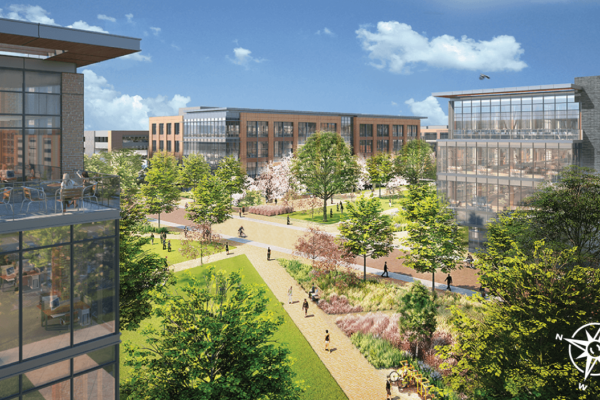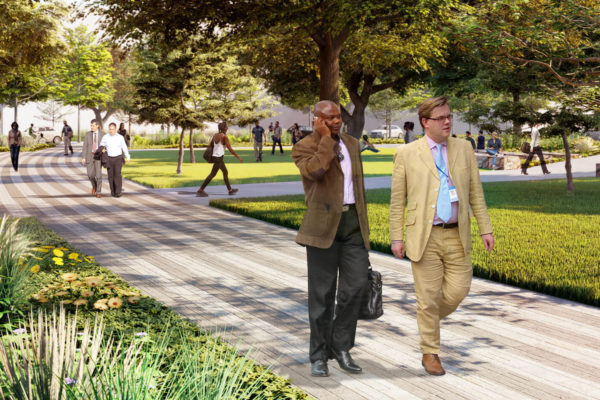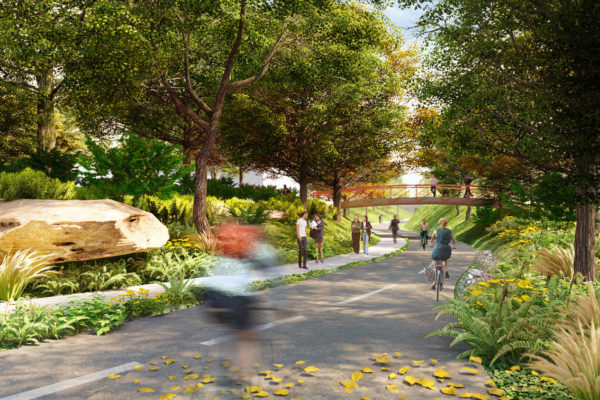There are many positive things Walmart is doing that doesn’t grace the headlines, from the changes they’ve made in how they do business to the countless ways they give and strengthen our local communities—check out these recent efforts and announcements.
Social Impact is the Catalyst for Walmart’s Corporate Philanthropy
“Together, Walmart and the Walmart Foundation generally provide more than $1 billion in cash and in-kind to support programs that align with our philanthropic priorities. We focus on areas where we can do the most good—combining the unique strengths of the business alongside our philanthropy. Our ability to draw on Walmart business strengths, providing more than just funding, helps our philanthropy to deliver greater societal impact. — Walmart.org
1,400,000,000
In FY2019, Walmart donated more than $1.4 billion globally.
Walmart has increasingly been making efforts to redefine corporate philanthropy. Kathleen McLaughlin, Chief Sustainability Officer at Walmart and President of the Walmart Foundation, states in a LinkedIn post that Walmart’s corporate philanthropy puts considerations of social impact front and center in order to create opportunity and strengthen communities: “Many companies have come to realize the enormous potential of a more strategic approach to corporate philanthropy that aims higher and unlocks the power of business alongside philanthropy to help transform the societal systems that all of us, including business, rely on.” Walmart’s philanthropic approach is global in aspirations, as their strategy goes beyond what businesses can do and “seeks to build stronger systems in areas that align with our business strengths and matter to customers, associates, and stakeholders,” says McLaughlin.
Walmart is Taking Steps toward Becoming Environmentally Sustainable
“At Walmart, we are focused on reducing emissions in our operations, engaging suppliers to reduce emissions in supply chains, strengthening the resilience of our business, and using our voice to advocate for collective action.” — 2019 Environmental, Social, Governance Report
Environmental changes due to global warming affect us all, and big businesses like Walmart have an important part to play in reducing their environmental footprint and turning to more sustainable practices. As stated in Walmart’s 2019 Environmental, Social, Governance Report, Walmart and Sam’s Club U.S. suppliers have improved their Sustainability Index scores by 28% compared to 2016, while achieving 6.1% reduction in “Scopes 1 and 2 annual greenhouse gas emissions in 2017 compared to 2015.” Besides taking these strides, an estimated 28% of the electricity used by Walmart comes from renewable sources, and that 81% of their “unsold products, packaging and other waste materials” has been diverted from landfills and incineration. Globally speaking, Walmart has diverted more than 1.6 billion pounds of food waste from landfills which is helping keep our environment cleaner. Walmart is also aiming at a zero-plastic-waste policy–something that consumers can easily get behind even with small acts like using one of their reusable fabric shopping bags.
Walmart has set out an ambitious environmental program for the future: by 2025, they want to “[a]chieve an 18% emissions reduction in our own operations […] compared to a 2015 baseline” and “[b]e powered by 50% renewable sources.” By 2030, they want to work with suppliers to “reduce or avoid carbon dioxide equivalent (CO2e) emissions from Scope 3 by 1 giganton from global value chains.” They also want to achieve “100% recyclable, reusable or industrially compostable packaging in all Walmart private-brand products,” reads the report.
Walmart Incentivizes and Invests in Upward Mobility
“By 2025, Walmart U.S. will put millions of associates through focused training programs to equip them with skills to improve career growth, from entry-level positions to jobs with more responsibility and higher pay. Training programs include Pathways and Walmart Academy.” — 2019 Environmental, Social, Governance Report
The Environmental, Social, Governance Report also shows how Walmart is encouraging upward mobility, equipping employees with resources and skills to further professionalize. Their workforce development approach “focuses on access, stability, and mobility”: “Workforce development is one of the biggest issues facing economies around the world, especially as technology accelerates the pace of change for the jobs of today and tomorrow […] Because the retail industry provides a point of entry into the job market for millions of workers, it has the potential to act as a springboard for economic mobility if workers can gain the experience and skills required to advance.” This approach stems from the need to modernize Walmart’s workforce by teaching skills that are critical in the 21st century.
Walmart has also decided to expand a unique program designed for women and men who have at least five years of professional experience and who took a career pause of at least two years for caregiving. In partnership with Path Forward, a nonprofit organization with a mission to empower people to restart their careers after time away for caregiving, the return-to-work opportunity will be available in multiple locations including San Bruno, Sunnyvale, and Carlsbad, CA; Bentonville, AR; and Reston, VA. The aim is to recruit up to 100 candidates “to pursue roles in areas such as engineering, user experience, product management, and data science,” says Bobbie Grafeld, Vice President of People at Walmart Labs. With this “returnship” program, Walmart is hoping to add to the diverse technical talent at Walmart Labs.
Walmart is addressing major potential risks to the dignity of workers. A signatory of Catalyst CEO Champions for Change, Walmart respects human rights in the supply chain, and has been working with and through their suppliers to mitigate “risks related to worker safety and well-being.” Additionally, Walmart places great importance on workplace diversity, as 55% of Walmart’s total U.S. workforce is female: “our efforts are underpinned by a commitment to fostering a culture of diversity and inclusion throughout our company. By investing in a more diverse and dynamic workforce, we hope to keep pace with evolving customer demands, while also acting as a force for economic inclusion.”
Lebron James and Walmart Team Up to Improve Local Communities
“The partnership with Walmart is about commitment to the community. Walmart has done so many things over the world, but it starts in your hometown of Bentonville, Arkansas, same as me starting at my hometown of Akron, Ohio. We don’t forget where we come from.” — Lebron James
Lebron James and Walmart have teamed up to strengthen communities by investing in their education, fighting hunger, and providing them with several other resources for growth. Janey Whiteside, Chief Customer Officer at Walmart, explains that chief responsibility of this partnership is “to make a positive impact in the communities where we operate. When communities are strong, and when the individuals who make up those communities thrive, we all win.” While Walmart’s primary purpose is to help lower the cost of living for families “so they can save money and live better,” they also see as strengthening communities as a chief objective, which is also a key goal of James.
1,018,777,965
Meals Secured During “Fight Hunger. Spark Change.” Since 2014
With the help of Lebron James, the 6th Annual Fight Hunger, Spark Change campaign surpassed 1 billion meals secured for food insecure families throughout the United States. Did you know that each year Walmart donates around 600 million pounds of food (55% of which are fruits, vegetables and meat) to local food banks?!
Walmart is Moving to a New Home Office
“We’ve spent the past couple of years imagining what Walmart’s ‘dream home’ might look like. We’ve thought a lot about how we want to work together as our company grows and changes. With our associates and the community in mind, we’ve landed on a design that reflects our values, honors our history, and enables our potential.”— Dan Bartlett, Executive Vice President, Corporate Affairs
For the last two years, Walmart has been developing plans for a new home office: a campus in Bentonville, Arkansas, with flexible workspaces, neighborhood bike paths, convenient parking, and dining options. To reflect their ideal home, designers have envisioned a space that promotes real connections, creativity, and health: “This means ample natural light, expanded food offerings, convenient parking, fitness options, and a child care facility. They want to work in an office environment that makes them better every day, just as they do the same for the company every day,” says Dan Bartlett, Executive Vice President, Corporate Affairs. Walmart is pursuing a modern vision of their home office, one that can “help attract the next generation of talent with state-of-the-art technology and contemporary conveniences.”
Walmart is ahead of the curb in sustainability when it comes to their new offices, too, as the campus has been designed with Walmart’s environmental goals in mind. The buildings on this campus will run with 100% renewable energy: “When we think about the future, it’s crucial that we also think about how we are going to preserve our planet and resources for the next generation, while promoting well-being for our associates both today and tomorrow. This includes the buildings themselves—solar panels atop parking decks, energy-efficient lighting and HVAC systems, and regionally sourced building materials, including mass timber construction—in addition to the connected design of the campus as a whole.” People who are happy in their work space definitely work better and Walmart has certainly taken this into account as their new campus will provide habitat for wildlife and bike trails. The campus will contain more than 15 acres of lakes and “native landscape design,” so that the new home office is deeply integrated with the surrounding nature.
Influential companies like Walmart have the power to better the world not only by providing quality goods and services but also by understanding their impact on people and communities every single day. Walmart is taking this responsibility seriously and leading the way in sustainable practices, supporting its employees and communities, while striving for social change. Future success of any business can be measured by its ability to adapt to the needs of consumers and how well it understands the changing social landscape of the world—Walmart undoubtedly has its finger on the pulse and will continue to grow and change with the rest of us!

















